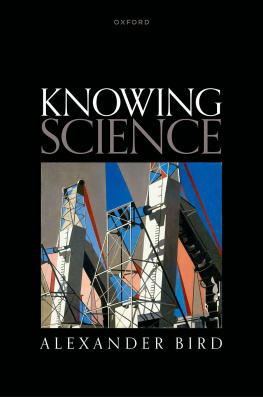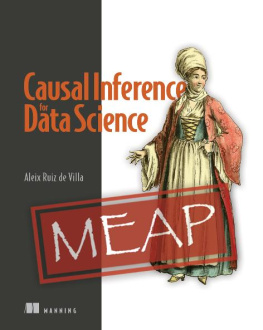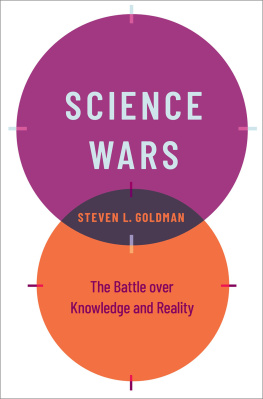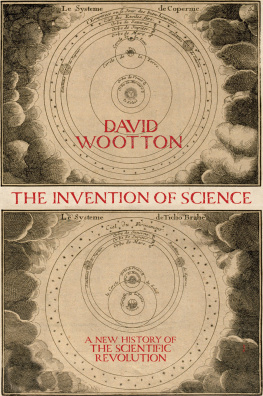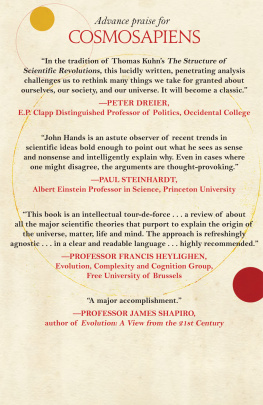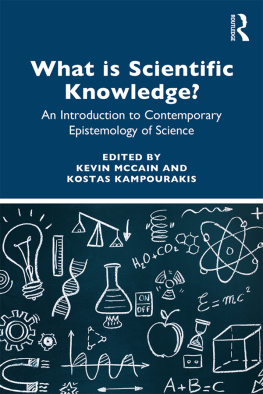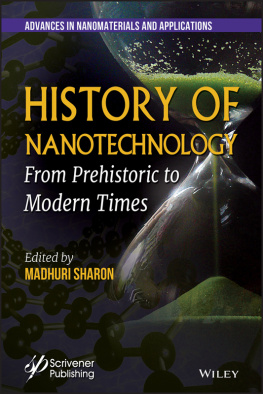Knowing Science

Great Clarendon Street, Oxford, OX2 6DP, United Kingdom
Oxford University Press is a department of the University of Oxford. It furthers the Universitys objective of excellence in research, scholarship, and education by publishing worldwide. Oxford is a registered trade mark of Oxford University Press in the UK and in certain other countries
Alexander Bird 2022
The moral rights of the author have been asserted First Edition published in 2022
Impression: 1
All rights reserved. No part of this publication may be reproduced, stored in a retrieval system, or transmitted, in any form or by any means, without the prior permission in writing of Oxford University Press, or as expressly permitted by law, by licence or under terms agreed with the appropriate reprographics rights organization. Enquiries concerning reproduction outside the scope of the above should be sent to the Rights Department, Oxford University Press, at the address above
You must not circulate this work in any other form and you must impose this same condition on any acquirer
Published in the United States of America by Oxford University Press
198 Madison Avenue, New York, NY 10016, United States of America
British Library Cataloguing in Publication Data
Data available
Library of Congress Control Number: 2022942402
ISBN 9780199606658
ebook ISBN 9780192606839
10.1093/oso/9780199606658.001.0001
Printed and bound by
CPI Group (UK) Ltd, Croydon, CR0 4YY
Links to third party websites are provided by Oxford in good faith and for information only. Oxford disclaims any responsibility for the materials contained in any third party website referenced in this work.
For Sebastian, Benedict, and Ishbel,
and for Stephanie, Arthur, Ottilie, and Toby
Preface
The central messages of this book can be summed up as saying, regarding philosophy of science:
knowledge good, empiricism bad.
Empiricism has long interested me. My first academic job lasted for ten years at the University of Edinburgh, with an office in the David Hume Tower. The history of empiricism was present to those of us who walked the same streets as Hume and his contemporaries. I lived just off Princes Street at one end, Humes house was just off Princes Street at the other end. My cycle route to work took me past the Mercat Cross (market cross) in Parliament Square, standing where, in the late eighteenth century George IIIs chemist John Amyatt famously remarked, one could in a few minutes, take fifty men of genius and learning by the hand.
For a philosopher of science, empiricism was also orthodoxy. It was sciences foundation in experience that differentiated it from other areas of intellectual activity and which explained its remarkable success. The task for a philosopher of science, if she is a realist, is to show exactly how the great edifice of scientific knowledge, knowledge of a world of imperceptibly small and large entities, of unobservable processes, of long past events and changes to come, is built on such foundations. Not all empiricists felt this could be doneknowledge of these things cannot be achieved when our evidential resources are limited to our experiences. In which case the task of the philosopher of science would be to show how science is still an important intellectual achievement, even if it is not quite what one might think it to be. (Some empiricists try to square the circle by adopting an unorthodox metaphysics. Experience can give us knowledge of the world in its entiretyif what the world is made of is experience itself.)
So I had both historical and contemporary reasons to be interested in empiricism. The first large, international conference I organised (with Richard Foggo, now a senior mandarin in the Scottish civil service) was thus entitled The Legacy of Empiricism, taking place in September 1996. ( This conference was held in honour of George Davie, the historian of Scottish philosophy.) After this conference my thinking about empiricism began to change. A given for me was that the standard picture of science as capable of delivering knowledge (at least sometimes), is right. I had taken David Armstrongs lesson to heart, that if a fancy philosophical argument tells us that X is true, but you have every (non-philosophical) reason to think that X is false, then you have good reason to doubt that the philosophical argument is sound. I began to agree with the above-mentioned empiricists who argued that a realist picture of science cannot be supported by empiricism. Yet I could not agree with empiricist anti-realism, let alone with a non-standard metaphysics. It began to dawn on me that empiricism itself was the problem.
At that conference I listened to Timothy Williamsons new paper Knowledge as evidence in which he expounded his now famous view that a subjects evidence is precisely what they know, E=K. (This paper was published the following year as Williamson (1997). Tim was then the recently arrived Professor of Logic and Metaphysics at Edinburgh.) Although he did not particularly present it as such, it struck me that this equation has profoundly anti-empiricist implications. Empiricism and the orthodoxy in the philosophy of science took it that evidence claims must have a very special kind of originthey must come directly from sense-experience. Consequently they must have a particular kind of contentthey can only be about things that can be experienced. And it was this restriction that was the source of empiricisms anti-realist implications. E=K, however, places no such restrictions on what can be evidenceanything that can be known can be evidence. Furthermore, if one is an epistemological externalist, anything can be known with which one can be in the right kind of external connection (e.g. a reliable belief-forming connection).
So the view I found myself developing was one that rejected empiricism and embraced epistemological externalism, and in particular Williamsons knowledge-first approach. This book is the product of that thinking. Some parts of the book, such as the first drafts of What is scientific progress? (Bird , date back to my time at Edinburgh and owe a great deal to the knowledge-first programme that I was fortunate enough to see developing at first hand. Much of the remainder was developed while I was at the University of Bristol, where I benefitted from many exchanges with James Ladyman and Samir Okasha, and subsequently at Kings College London, again learning from my colleagues, Clayton Littlejohn, Julien Dutant, and David Papineau.
Many people have commented on various parts of the book or provided useful advice, information, or discussion. I am very grateful for their generosity. We all have so little time to spare in our working lives, and so I am conscious of the value of the effort put into helping me with this work as well as the value of the comments themselves. In particular I would like to thank Chris Allton, Kabir Bakshi, Helen Beebee, Bill Brewer, Alex Broadbent, Armando Cintora, Julien Dutant, Ludwig Fahrbach, Robin Hendry, Alison Hills, Milena Ivanova, James Ladyman, Tim Lewens, Clayton Littlejohn, Kevin McCain, Hugh Mellor, Samir Okasha, David Papineau, Richard Pettigrew, Stathis Psillos, Mona Simion, Deborah Tollefsen, Peter Vickers, Ralph Wedgwood, Alan Weir, Oscar Westerblad, and Timothy Williamson. Especial thanks are due Ted Poston, who wrote extensive comments on every chapter that have helped improve the book immeasurably, to Roy Sorensen, who suggested its title, and to Ned Campbell, who helped me find the cover artwork. I am grateful to my editors, Henry Clarke and Peter Momtchiloff, for their support, encouragement, and patience.

